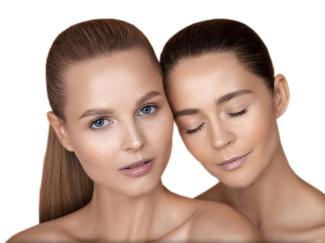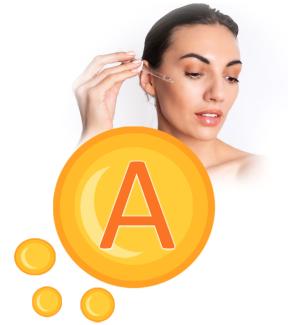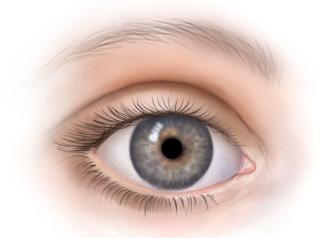
Retinoids, which are derivatives of vitamin A, can be effective in promoting youthful and firm skin. They are a widely used and well-researched class of skincare ingredients with several benefits for the skin, including:
- Collagen production: Retinoids can stimulate the production of collagen, a protein that helps keep the skin firm and elastic. This can improve skin texture and reduce the appearance of fine lines and wrinkles.
- Cell turnover: Retinoids encourage skin cell turnover, which means that newer, healthier skin cells replace older ones more quickly. This can lead to smoother, more youthful-looking skin.
- Even skin tone: Retinoids can help fade dark spots, hyperpigmentation, and acne scars, resulting in a more even skin tone and improved complexion.
- Prevention of clogged pores: They also help prevent the formation of clogged pores, which can reduce the risk of acne and promote clearer skin.
- Improved texture: Retinoids can make the skin feel smoother and softer, which contributes to a more youthful appearance.
However, it's important to note that while retinoids can be highly effective, they can also be potent and may cause some side effects such as dryness, redness, and peeling. Therefore, it's essential to use them with caution and under the guidance of a dermatologist or skincare professional. They should be introduced gradually into your skincare routine, and it's crucial to use sunscreen during the day because retinoids can make your skin more sensitive to the sun.
Different types of retinoids are available, both over-the-counter and by prescription, with varying strengths and formulations. The choice of which one to use depends on your skin type, concerns, and tolerance.
In summary, retinoids can be an effective component of a skincare routine for maintaining firm and youthful skin, but they should be used wisely and in conjunction with other skincare practices, including sun protection, to achieve the best results.
Where can I get retinoids?
You can obtain retinoids through various sources, including over-the-counter (OTC) products and prescription medications. The availability and strength of retinoids may vary depending on your location and local regulations. Here's where you can get them:
- Over-the-Counter (OTC) Products: Some less potent forms of retinoids, such as retinol and retinyl palmitate, can be found in OTC skincare products. These products are available in drugstores, beauty stores, and online retailers without the need for a prescription. Examples of OTC retinoid products include:
- Retinol creams and serums
- Retinol-based moisturizers
- Retinol-infused anti-aging products
- Prescription Medications: Stronger retinoids, like tretinoin (Retin-A), adapalene (Differin), and tazarotene, are typically available only by prescription. To obtain these, you need to consult a dermatologist or healthcare provider who can assess your skin and prescribe the appropriate retinoid for your specific needs.
- Online Pharmacies: Some online pharmacies and telemedicine services may offer prescription-strength retinoids. However, it's crucial to exercise caution and ensure that you are dealing with a reputable source when purchasing prescription medications online. Always consult a healthcare professional before using prescription-strength retinoids.
When using retinoids, it's important to follow the instructions provided with the product or those given by your dermatologist or healthcare provider. Start with a lower strength if you are new to retinoids, and gradually increase as your skin becomes accustomed to the product. Additionally, always use a broad-spectrum sunscreen during the day when using retinoids, as they can make your skin more sensitive to the sun.
Before using any retinoid product, it's a good idea to consult with a dermatologist, as they can provide personalized recommendations and guidance based on your skin type and specific concerns.






